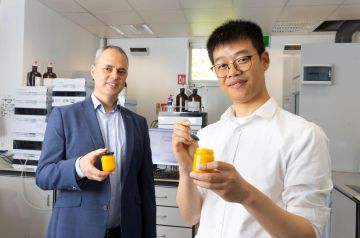20 years of research culminates in a simple dairy solution to a dietary deficiency
Irish scientists are using yoghurt to make it easier for people to consume a nutrient which may help reduce the risk of both age-related macular degeneration (AMD) and Alzheimer’s disease.
Lutein is an antioxidant and anti-inflammatory xanthophyll carotenoid present in leafy green vegetables and coloured fruits and found in very high amounts at the macula of the human retina (the centre part of the back of the eye) and also in the brain.
Using carotenoids to manage the disease
While lutein is not a cure for these age-related diseases, published studies are very clear that carotenoids, including lutein, should be used in the management of these diseases.
Significantly, lutein is not made by the body and has to be sourced entirely from diet or from food supplements, and studies are showing that we are not consuming enough lutein as part of our normal diet. This is not just because kale isn’t a big favourite – analysis of leafy green vegetables has shown, over the last 40 years, a drastic reduction in the amount of lutein and other carotenoids present in these foods. Capsule-based nutritional supplements can help, but not everyone is able to take them.
FortiXan - new lutein formulation
Researchers from the Nutrition Research Centre Ireland (NRCI) at South East Technological University (SETU) in Waterford, under the VistaMilk SFI Research Centre umbrella, have successfully added the new lutein formulation – called FortiXan – to yoghurt. The resulting dairy product will enable people to obtain more of the carotenoid simply and easily and will have the potential to improve human vision and cognitive function.
Commenting on the development, Dr Alfonso Prado-Cabrero of the NRCI confirmed that a human clinical trial has been conducted with the FortiXan yoghurt. “We have proved that the yoghurt effectively delivers the lutein into the bloodstream,” he said.
Prof John Nolan, Principal Investigator at the NRCI explained: “Our research has demonstrated that lutein, along with other carotenoids, is really effective at enhancing vision across all the ages and also for patients with AMD and Alzheimer’s disease.
Unique method of delivery
“Nature wants us to have these carotenoids from a very young age, but the food we are eating is deficient in carotenoids. FortiXan yoghurt is a unique method of delivery that will enable these essential nutrients to reach a wider population group including children and vulnerable individuals who may experience difficulties in swallowing.
“We believe that lutein should be considered as an essential nutrient in everyone’s daily diet and that Fortixan yoghurt should become a valuable source of the nutrient lutein alongside more traditional sources. What we need now is a visionary partner to recognise the importance of what we have discovered and help make it widely available to the general public to enhance their quality of life.”
The NRCI is a multi-disciplinary research group within SETU studies the role of nutrition and lifestyle for human well-being. James O’Sullivan, Head of Innovation and Commercialisation, said: “SETU places great emphasis on research and innovation. The recent breakthrough is a testament to the significant influence our scientists can have on improving societal health issues. Ultimately, commercialising this innovation through an industrial partner will showcase a true achievement.”
Photo caption: Dr Alfonso Prado-Cabrero and Hao Shi, NRCI


